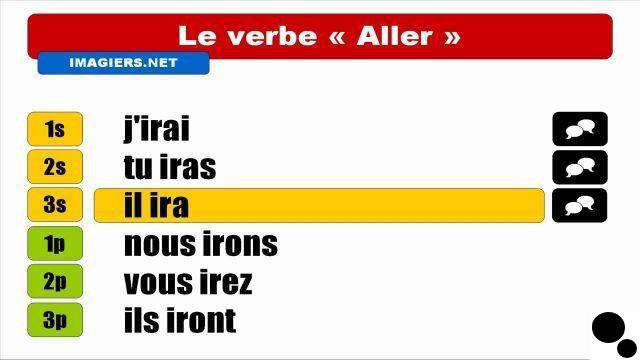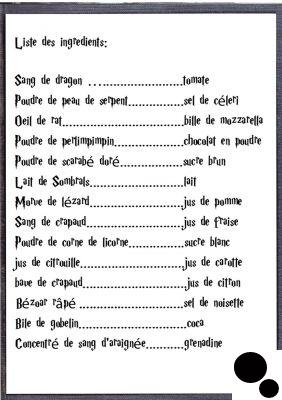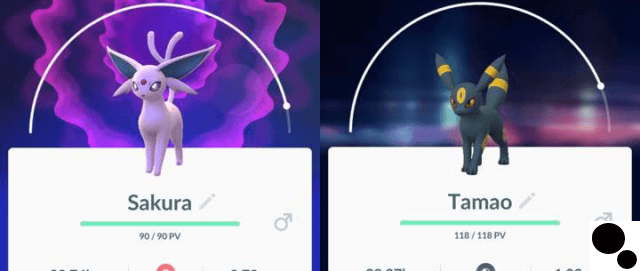
Au future and in the present conditional, we use the base ir- to all persons. It remains to add the regular endings of the future (I will go, you will go, he will go, we will go, you will go, they will go) and those of the conditional: I would go, you would go, he would go, we would go, you would go, they would go.
thus How to conjugate Go to the simple past?
| indicative | |
|---|---|
| present | Past compound |
| Simple past | Past prior |
| I went you went he went we went you went they went | I had gone you had gone he had gone we had gone you had gone they had gone |
| Future tense | Futur prior |
How to conjugate aller in the present imperative? The verb " all belongs to the third group (despite its ending in -er) and it conjugates with the auxiliary "to be". let's see how to conjugate the verb " all » to the different forms of the imperative .
...
Au present :
- I go,
- You go,
- He goes,
- We're going,
- You go,
- They go.
moreover, How do you conjugate the verb aller in the past tense?
* The perfect tense is formed from the auxiliary 'être' or 'avoir' au present of the indicative and with the past participle du conjugated verb. exp 1: They went to the circus. Verbe be at present / past participle du Verbe 'all. exp 2: I / browsed the Net.
Contents hide 1 How to conjugate the verb aller in the imperative? 2 How is the imperative formed? 3 How to conjugate the verb aller in the imperfect? 4 What are the rules of the imperative? 4.1 What are the pronouns of the imperative?How to conjugate the verb aller in the imperative?
Imperative
- goes.
- lets go.
- go.
How to conjugate the verb aller in the present indicative? Le verb to go is from the third group.
- indicative .
- present . I'm going. you go. he will. …
- I went you went he went we went. …
- I was going. you were going to. He went. we went. …
- I had gone you had gone he had gone we had gone. …
- j'allai. tu allas. il alla. ⁇
- I had gone you had gone he had gone...
- I will go. you will go. he will go.
How to conjugate the verb aller in the present subjunctive?
- go. go. go. I do not know.
- were going. go. lets go. I do not know.
- am going to. go. go. I do not know.
- go. go. go. I do not know.
- go. Allez . all . I do not know.
- go. go. goes. I do not know.
- are going. go. go. I do not know.
- goes. go. go. I do not know.
When to put an S in the imperative? L'imperative present usually ends with a " s in the 2nd person singular, except for the verbs of the 1st group (ending in -er) which end in an e: Mange (1st group)! Get out (3rd group)!
How is the imperative formed?
Verbs atimperative only conjugate with three persons: the 2nd person singular and the 1st and 2nd persons plural. The subject personal pronoun is not expressed before the verb. It is formed on the same radical as the present indicative, to which the following endings are added: -e, -ons, -ez.
What is the verb will go? Reverse conjugation for ira
| Verb infinitive | Conjugation of Verbe | Person of the conjugation |
|---|---|---|
| all | il go to | third person singular |
How is the verb go conjugated?
Il conjugates according to 3 distinct radicals: the radical goes to the present of the indicative and to the imperative: je go, you go…, the radical ir in the future and in the conditional: I would go, you will go…. … In the imperative, before the adverbial pronoun y not followed by an infinitive, go takes an s: go ahead but we write go do your homework there.
What is the group of the verb to go? Verb of the third groupe conjugating with Being.
How to conjugate the verb aller in the imperfect?
Conjugation verb go
- Here. I'm going. you go. he will. we go. you will. they go. Perfect tense …
- Imperfect . I was going. you were going to. He went. we went. you were going to. they went. ...
- Simple past. I went. you go. he went. We went. you went. they went. ...
- Future tense . I will go. you will go. he will go. we will go. you will go. they will go.
How to find the stem of a verb?
For Verbe of the first group like singing, we find the radical removing the -er ending. the radical is therefore "chant-" and the ending "-er". For the verbes of the 2nd group, we proceed in the same way and we remove the final ending -ir.
What is the present participle of go? "am" ("to be") is au present and "gone" is the participle past tense of the verb all" page (in French).
What is the present participle of the verb go? Important!
| INDICATIVE | |
|---|---|
| present I will you will he will we will you Allez they go | past tense I went you went there is went we went you went they are gone |
| present go let's go Allez | past have gone let's have gone have gone |
| INFINITIVE | |
| present all | past to have gone |
What are the rules of the imperative?
The main feature of theimperative is to exist only to people: you, us and you, without an expressed subject. It allows you to express an order, give advice or make a suggestion. In general, theimperative is identical to the present indicative except that it has no subject.
Why is there no s in the present imperative? No s why ? The endings ofimperative present are distinguished from those of the indicative present by the absence of a –s in the second person singular of certain verbs. … He didn't know Latin no s in the conjugations ofimperative, unlike those of the indicative.
When to put an s in the second person singular?
All the verbs of the first group take a " s » when we combine them with second person singular in the present tense. With verbs in “ir” like “bouncing”, or in “re” like “descending”, there is still a “ s " with you ". And "to see" also takes a " s in the present and becomes “you see”.
What are the 3 persons of the present imperative? L'Present imperative
The main feature of theimperative is to exist only at people : you, us and you and this, without expressed subject. It allows you to express an order, give advice or make a suggestion.
What are the imperative pronouns?
The order that must be respected is the following: pronouns le, la, l' and les must always be closest to the verb; the pronouns there and in are on the contrary, always the furthest from the verb.
How to put a sentence in the imperative? Examples: Don't go out without your coat! In this first phrase the verb is atimperative and expresses an order.
Don't forget to share the article with your friends!


























